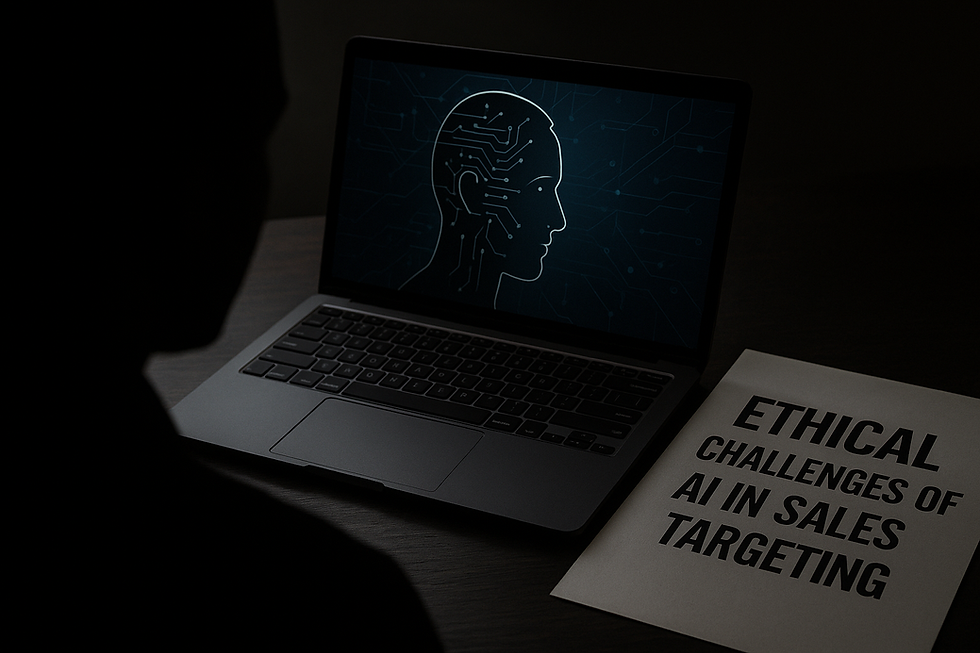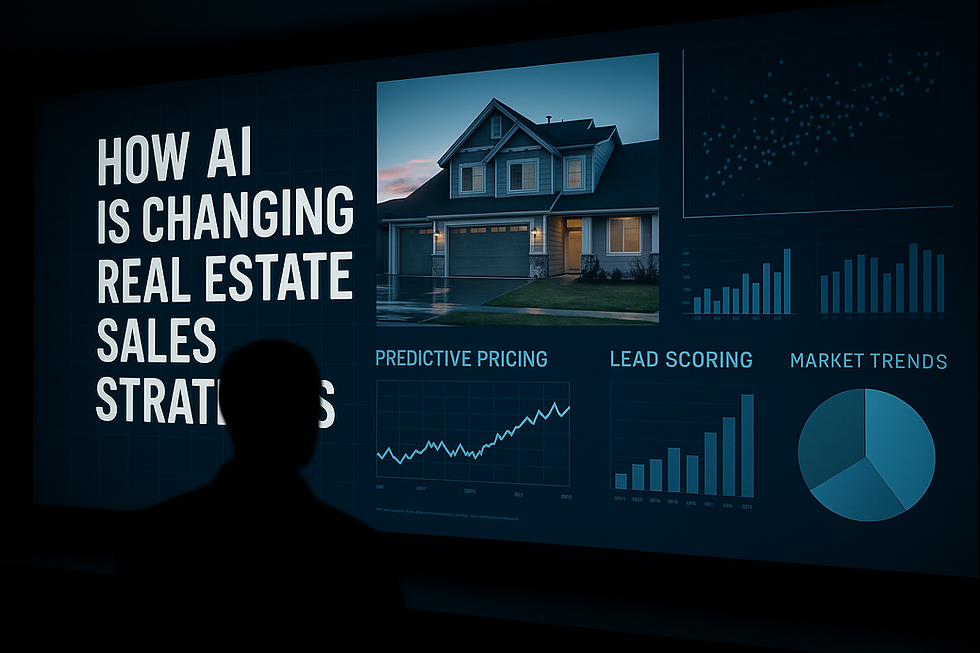Ethical Challenges of AI in Sales Targeting
- Aug 19, 2025
- 5 min read

Ethical Challenges of AI in Sales Targeting
When Sales Knows Too Much
It’s not science fiction anymore. Your browsing history, your buying habits, even the time you spend reading product pages—it’s all being watched. Not by people. But by artificial intelligence. Powerful algorithms, trained on mountains of behavioral data, are now deciding who gets targeted by sales teams, with what message, at what time, and even at what price.
This isn’t just about smarter selling. It’s about boundaries we never agreed to. It’s about lines being crossed—not in code, but in conscience.
Welcome to the era of AI ethics in sales targeting—where machines don’t just help sales reps, but silently shape decisions that affect fairness, privacy, and trust.
Sales professionals, marketers, and tech builders are standing at a moral crossroads. The rise of AI in sales targeting—while promising efficiency and explosive revenue growth—has unleashed a storm of ethical dilemmas that the world can no longer ignore.
So we’re going deep. Not into vague what-ifs, but into real-world harms, documented bias, emerging regulations, true discrimination, and the uncomfortable truths already playing out in CRM dashboards, corporate boardrooms, and digital ad networks across the globe.
Bonus: Machine Learning in Sales: The Ultimate Guide to Transforming Revenue with Real-Time Intelligence
This Isn’t a Bug. It’s the System.
AI doesn’t make up rules. It learns from the data we give it. That’s where the ethical nightmare starts.
In 2021, MIT researchers published an analysis showing how AI-driven ad platforms like Facebook’s allowed targeting based on race proxies, such as ZIP code, income level, or inferred cultural preferences—even after explicit race-based targeting was prohibited 【Source: MIT Technology Review, 2021】.
Even worse, in an investigation by The Markup in 2022, it was found that Amazon’s algorithm was showing higher-priced products to lower-income users compared to wealthier users who were being shown discounts for the same product, thanks to behavioral targeting 【Source: The Markup, 2022】.
We are not talking about theoretical bias. These are real-world systems in operation, right now, shaping what people see, what they pay, and whether they’re even given a chance to buy.
The Illusion of Consent
Let’s be honest—users never fully consent to being targeted by AI systems in sales. Not in any meaningful way.
A 2023 report by Pew Research Center found that:
“81% of Americans feel they have little or no control over the data companies collect on them, and 79% are concerned about how that data is used.” 【Source: Pew Research Center, “Americans and Privacy,” 2023】
This is despite GDPR, CCPA, and countless cookie banners. Consent has become a checkbox ritual, not a genuine agreement. And in this broken system, sales targeting powered by AI operates like a surveillance economy.
It’s not just creepy—it’s deeply unethical.
Real Lives, Real Harms: Case Studies
Case Study 1: Predatory Lending Algorithms
In 2020, the Consumer Financial Protection Bureau (CFPB) began investigating companies like Upstart and Zest AI, whose machine learning sales models for lending targeted people with lower financial literacy, pushing them toward high-interest loans. Though the companies claimed their models were unbiased, investigations showed that people in majority-Black neighborhoods were more likely to be targeted with these high-cost offers 【Source: CFPB, 2020 Report】.
This is a direct sales targeting harm driven by AI.
Case Study 2: Facebook’s Discriminatory Housing Ads
In 2019, the U.S. Department of Housing and Urban Development (HUD) charged Facebook with violating the Fair Housing Act. Their ad-targeting tools enabled real estate advertisers to exclude users based on gender, race proxies, and disability-related interests using AI-inferred data 【Source: HUD v. Facebook, 2019】.
This wasn't just about ad delivery. It was about denying people access to opportunities. In sales, these kinds of exclusions can reinforce systemic inequalities.
What Makes AI Sales Targeting So Dangerous?
There are three critical ethical vulnerabilities:
1. Opacity
Sales teams often use AI as a black box. They don’t know how the model made the decision—it just “works.” That’s not good enough.
“You cannot have accountability without transparency.”— Timnit Gebru, former AI Ethics Lead at Google 【Source: NYT Interview, 2020】
When sales models decide who gets followed up and who gets ignored, and no one understands the logic, discrimination hides in the code.
2. Automation of Injustice
Sales AI isn’t just mimicking bias. It’s scaling it. If your historical sales data is biased—say, it favored white male prospects or excluded low-income ZIPs—the AI will learn and enforce that pattern 10,000 times faster.
A 2022 paper in Nature Machine Intelligence showed that biased historical sales data produced 25% lower opportunity scores for minority groups—even when qualifications were identical 【Source: Nature Machine Intelligence, 2022】.
3. Emotional Manipulation
AI targeting doesn’t just know your budget. It knows your emotions.
Tools like Gong.io, Chorus.ai, and Cresta AI use sentiment analysis on sales calls to detect when prospects are vulnerable or anxious—and guide reps to “strike while the iron is hot.” While legal, this raises serious ethical red flags.
Should AI tell salespeople to close deals when someone is emotionally weak? Is that persuasion or predation?
The “Ethical Sales Stack” Doesn’t Exist Yet
In cybersecurity, we have security stacks. In marketing, we have martech stacks. But in sales ethics? Almost nothing.
Companies building AI-driven sales systems rarely have an ethics layer. Very few vendors offer features for:
Audit trails of AI decisions
Explainability dashboards
Fairness testing on lead scoring
Bias correction feedback loops
Even major CRMs like Salesforce, HubSpot, and Zoho don’t offer built-in ethical AI oversight tools in their lead targeting modules as of 2025.
That’s a vacuum. And that vacuum has consequences.
Regulatory Storm Clouds Are Gathering
Governments are waking up. Slowly.
The EU AI Act (Passed: 2024)
Europe’s sweeping AI regulation classifies AI in sales targeting as “high-risk” if it includes profiling or affects consumer rights. This will force vendors to audit, document, and explain decisions.
FTC Guidelines (USA, 2023 Update)
The U.S. Federal Trade Commission issued new guidance stating that automated sales decisioning systems must be explainable and non-discriminatory, or face penalties 【Source: FTC Tech Blog, 2023】.
China’s Algorithmic Regulation (2022)
China became the first country to require all algorithm providers to submit their models for review. AI systems used in sales targeting must now align with public values and fairness principles 【Source: Cyberspace Administration of China, 2022】.
The Ethics-First Sales Movement (Yes, It Exists)
Thankfully, there’s a growing movement to bring ethics into the heart of AI-powered sales.
Real companies are making real changes:
Salesforce’s “Ethical AI Use Guidelines” include bias audits for Einstein lead scoring models.
HubSpot Labs launched an open initiative to detect demographic bias in predictive lead scores in 2024.
Cresta AI introduced a “human-in-the-loop” override feature to stop manipulative nudges during sales coaching.
These are early steps. But they prove that ethical targeting is not just a dream—it’s an emerging discipline.
What Sales Teams Must Do Now
If you're using AI to target, prioritize, or pitch prospects—you’re responsible for how it works. Here’s a checklist for ethical readiness:
Audit Your Data
Where does your sales training data come from? Is it skewed? Clean it.
Explain Your AI
Don’t use black boxes. Demand tools that show why the system chose a lead or message.
Watch for Bias in Lead Scoring
Use real-time fairness dashboards. Flag and correct anomalies.
Respect Privacy
Stop over-tracking. Focus on declared intent, not hidden surveillance.
Include Ethics in Your Stack
Push your sales platform vendor for bias audits, override tools, and explainability features.
This Is About More Than Revenue
When AI decides who gets an opportunity, who sees an offer, or who gets followed up—it’s making moral decisions.
And if we don’t put guardrails around that power, we’re not selling better. We’re selling unfairly.
As AI grows deeper into sales workflows, we must build not just smarter systems, but fairer ones. Systems that lift everyone, not just those who resemble your historical best customers.
Sales targeting must evolve from cold, profit-driven precision to ethically grounded personalization.
The future of sales isn’t just about hitting quota.
It’s about doing it with conscience.

$50
Product Title
Product Details goes here with the simple product description and more information can be seen by clicking the see more button. Product Details goes here with the simple product description and more information can be seen by clicking the see more button

$50
Product Title
Product Details goes here with the simple product description and more information can be seen by clicking the see more button. Product Details goes here with the simple product description and more information can be seen by clicking the see more button.

$50
Product Title
Product Details goes here with the simple product description and more information can be seen by clicking the see more button. Product Details goes here with the simple product description and more information can be seen by clicking the see more button.



Comments